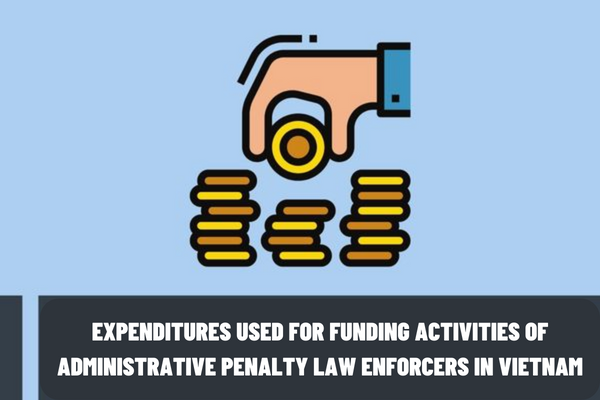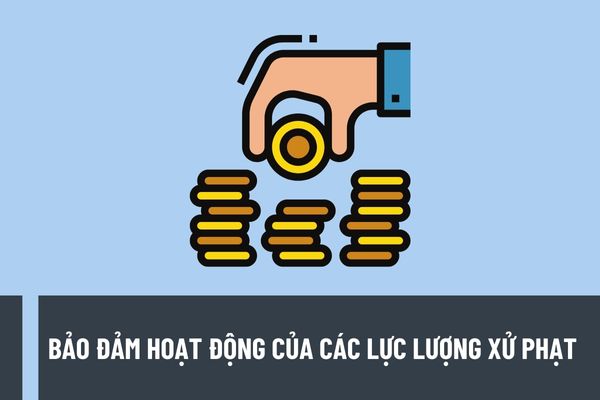What are the state budget expenditures used for funding activities of administrative penalty law enforcers in Vietnam?
- What are the rules of estimation, management, utilization and final accounting of state budget expenditures used for funding activities of administrative penalty law enforcers in Vietnam?
- What are the state budget expenditures used for funding activities of administrative penalty law enforcers in Vietnam?
- Guide to the estimation, management, use and and final accounting of state budget expenditures used for funding activities of administrative penalty law enforcers in Vietnam?
What are the rules of estimation, management, utilization and final accounting of state budget expenditures used for funding activities of administrative penalty law enforcers in Vietnam?
Pursuant to Article 11 of Circular No. 18/2023/TT-BTC stipulating the rules of estimation, management, utilization and final accounting of state budget expenditures used for funding activities of administrative penalty law enforcers as follows:
- Costs and expenses of activities of enforcers are covered by annual state budget expenditures allocated to Ministries, central authorities and local authorities.
- Costs and expenses of activities of enforcers employed by Ministries and central authorities are covered by the central government’s budget. Costs and expenses of activities of enforcers employed by affiliates or units in provinces and centrally-affiliated cities are covered by the local government’s budget according to the decentralized powers.
- Due management and utilization of state budget expenditures used for funding activities of enforcers shall ensure that these expenditures serve the right objectives and purposes, conform to the quotas, standards and regulations as prescribed by law.

What are the state budget expenditures used for funding activities of administrative penalty law enforcers in Vietnam?
What are the state budget expenditures used for funding activities of administrative penalty law enforcers in Vietnam?
Pursuant to Article 12 of Circular No. 18/2023/TT-BTC stipulating the objectives and levels of expenditures used for funding activities of administrative penalty law enforcers as follows:
(1) General expenditures:
- Propagating and spreading laws on sanctioning of administrative violations in compliance with the regulatory provisions of Joint Circular No. 14/2014/TTLT-BTC-BTP dated January 27, 2014 of the Minister of Finance and the Minister of Justice, stipulating the estimation, management, use and final accounting of state budget expenditures used for funding the dissemination and education of laws and standards of people’s access to laws at the grassroots level;
- Allowances for business trips, preliminary and final review meetings, training in sanctioning of administrative violations, subject to the Circular No. 40/2017/TT-BTC dated April 28, 2017 of the Ministry of Finance, prescribing business travel allowances and conference allowances;
- Procurement of equipment and repair of tools and means directly supporting the activities of enforcers in compliance with laws on management and use of public property and laws on bidding;
- Petrol and oil used for operating vehicles to inspect, arrest, escort and protect the subjects and exhibits of violations; communication, stationery, printing documents used for activities of enforcers: Based on actual payment vouchers and contracts of suppliers. Before disbursing funds for use as the aforesaid expenditures, cost estimates must be approved by competent authorities;
- Rewarding collectives and individuals for their achievements in administratively sanctioning activities in accordance with the Government’s Decree No. 91/2017/ND-CP dated July 31, 2017, elaborating on the implementation of a number of Articles of the Law on Emulation and Commendation;
- Extra pay for night work and overtime work in accordance with laws in force.
(2) Particular expenditures
- Expenditures on purchase of leads (if any):
+ The level of spending on purchase of a lead about each case of violation does not exceed 10% of the mount of fine plus proceeds from selling exhibits or means of violation confiscated and put into the public treasury (if any), and is restricted to VND 5,000,000.
In particular, the level of spending on purchase of a lead about each case of violation arising in the environmental protection domain does not exceed 10% of the mount of fine plus proceeds from selling exhibits or means of violation confiscated and put into the public treasury (if any), and is restricted to VND 50,000,000. Where the level of expenditure on purchase of leads exceeds the maximum limit above, the head of the unit directly investigating and sanctioning administrative violations may decide the exact level of expenditure falling within the budget limit set by a competent authority;
+ During the period of enforcement of an administrative penalty, if an administrative penalty decision is not issued; if the confiscated exhibit cannot be sold, subject to the requirements for destruction of exhibits or transfer of the right to manage and use an asset to a state authority in accordance with the 2012 Law on Handling of Administrative Violations, the level of expenditure on purchase of a lead does not exceed 10% of the value of the exhibit, and is restricted to VND 50,000,000;
In particular, the level of expenditure on purchase of a lead about an administrative violation against environmental protection laws does not exceed 10% of the value of the exhibit of that violation, and is restricted to VND 50,000,000. Methods of valuation of exhibits of violation shall be as defined in Article 60 in the 2012 Law on Handling of Administrative Violations;
+ Payment of costs and expenses incurred from purchase of leads shall be fully documented in accordance with regulations; where keeping a secret about an informant’s name is required, payment of costs and expenses incurred from purchase of leads shall be based on spending vouchers bearing required signatures of persons directly paying informants, cashiers, accountants and heads of units directly investigating and sanctioning administrative violations.
Heads of units directly investigating and sanctioning administrative violations shall be responsible for making accurate and actual payment of costs and expenses incurred from purchase of leads, and ensuring payments to right payees, for correct work and payments made on an effective manner.
- Allowances paid to enforcers according to compensation and benefits policies adopted by competent state authorities (if any).
Guide to the estimation, management, use and and final accounting of state budget expenditures used for funding activities of administrative penalty law enforcers in Vietnam?
Pursuant to Article 13 of Circular No. 18/2023/TT-BTC stipulating this content as follows:
Estimation, management, utilization and final accounting of state budget expenditures used for funding activities of enforcers shall be subject to the Law on State Budget and instructional documents thereof. This Circular provides detailed guidance on implementation of some of the following regulations:
(1) Budget estimation:
Annually, based on results of collection and spending related to sanctioning of administrative violations in the previous year and assessment of capabilities of implementation of the current budget, agencies and units assigned to impose administrative penalties shall make an estimate of expenditures specific to activities of enforcers as defined in Circular No. 18/2023/TT-BTC and submit them to a managing body for integration into the general state budget estimate which is then forwarded to the same-level financial agency for compiling purposes in accordance with the Law on State Budget and instructional documents thereof.
(2) Final accounting:
- Agencies and units assigned to estimate the state budget expenditures on activities of enforcers shall set up accounting books to record and account for costs and expenses, and integrate them into their annual state budget in accordance with laws on state budget, accounting and statistics;
- State budget spending on activities of enforcers shall be recorded and finally accounted for in corresponding chapters, items and sub-items specified in the state budget index in force.
LawNet
